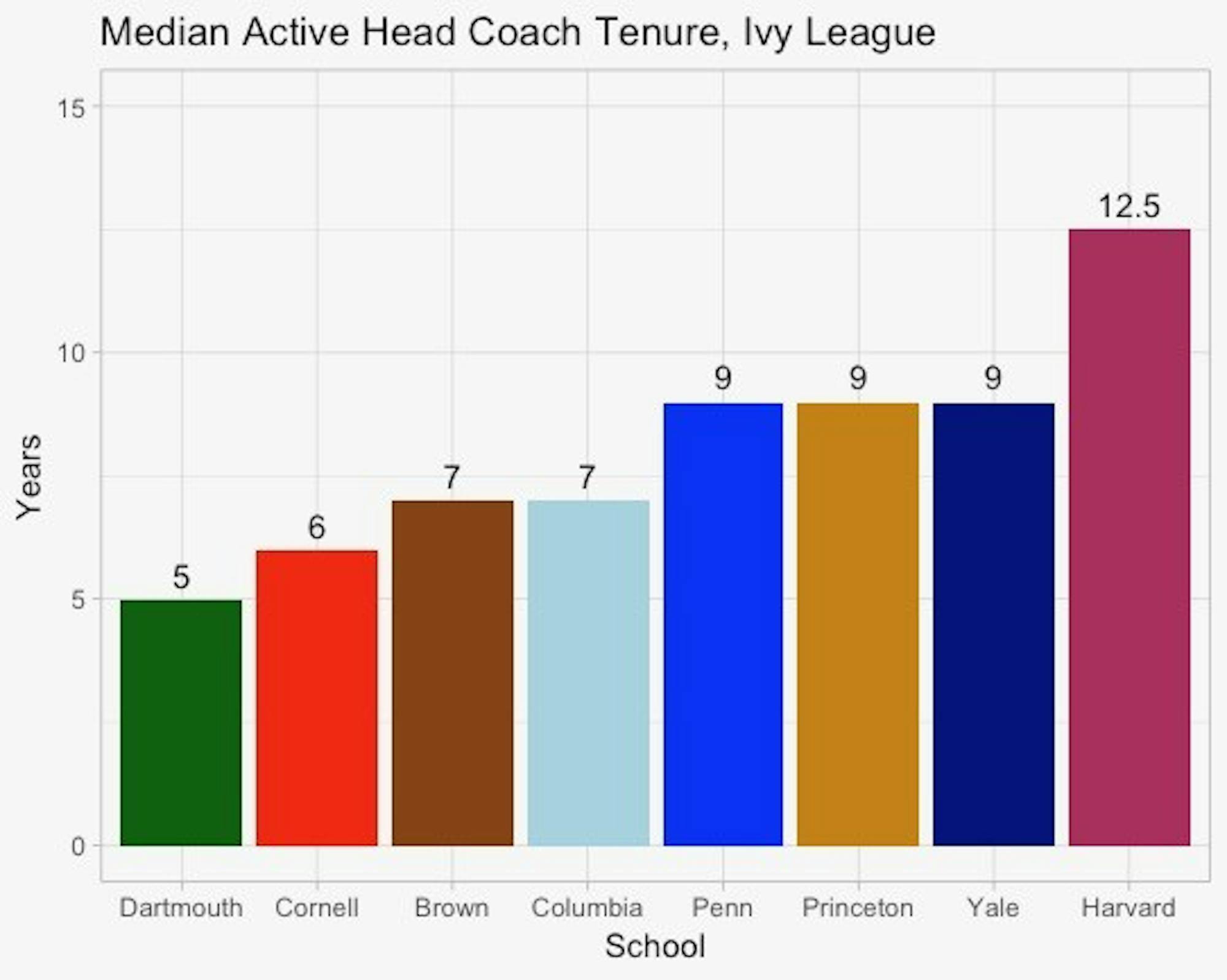With Dartmouth sports returning to a full year of competition for the first time since the 2018-19 season, 12 head coaches will take the helm without an uninterrupted athletic year at Dartmouth under their belts.
That’s not to say that Dartmouth doesn’t have experienced coaches. Dartmouth has four coaches with over 20 years of experience, including three — Peter Dodge (men’s nordic skiing), Cami Thompson Graves (women’s nordic skiing) and Bob Whalen (baseball) — who have held their head coaching jobs for over 30 years. This figure puts them in the middle of the pack, above Columbia University, Yale University, Brown University and the University of Pennsylvania.
But by almost all other measures, Dartmouth ranks at the bottom of the Ivy League in head coaching tenure.
On average, Big Green coaches have 7.9 years of experience running their teams, less than all of its Ivy competition. Columbia, Yale, Princeton University and Harvard University all average over 10 years of head coaching experience. Dartmouth’s average is also much lower than the Ivy League mean: 10.4 years.

Using the mean, however, likely overstates Dartmouth coaches’ tenure. Dartmouth has several head coaches who have had particularly long careers with the Big Green, skewing the average higher than it otherwise would be, even though it’s still low compared to the average at other Ivy League schools. Since there are several high outliers, finding the median coaching tenure perhaps better characterizes how much (or how little) experience Dartmouth head coaches have in their current roles.
At only five years, the median Dartmouth head coach tenure is much lower than the mean. Notably, this figure is also the lowest in the conference — much lower than Penn, Princeton, Yale (9) and Harvard’s (12.5) median tenures. Among women’s teams, median coaching experience is even lower: at a mere three years, Dartmouth sits at the bottom of the Ivy League.

Moreover, the Big Green’s 12 head coaches with two or fewer years of experience ranks atop the league both as an absolute number and as a percentage of total head coaches (37.5%). On the flip side, Dartmouth also has the lowest number of head coaches with 10 or more years in charge.

While it can be helpful to bring in fresh faces to change a team’s trajectory, it can also take time for coaches to establish recruiting infrastructures, implement their coaching philosophies and establish training regimens — time that many Dartmouth coaches have not yet been afforded with one or two seasons ravaged by the pandemic. This could put Dartmouth at a disadvantage compared to Columbia, Harvard and Princeton, which only have three coaches with two years or fewer at the helm. Conversely, it may provide a needed change of pace for struggling Big Green teams.
How did Dartmouth athletics end up in this situation — with the most head coaches with two or fewer years’ experience in their role, the fewest with 10 or more years in their role and ranked last in the Ivy League in both mean and median coaching tenure?
Part of it is circumstantial. Equestrian coach Sally Batton stepped away two springs ago after a well-decorated 29-year career and men’s hockey coach Bob Gaudet hung up his suit in 2020 after 23 years with the Big Green. Men’s cross country and track and field coach Barry Harwick also retired in August 2020 after 28 years directing the program. The women’s track and field program tragically lost Sandy Ford-Centonze to cancer on Dec. 14, 2019 after 28 seasons leading the team. Though Dartmouth retained most of its coaches after cutting and reinstating five teams last year, Jamie Holder declined his offer to return as head coach of the men’s and women’s swimming and diving programs.
Other coaches, especially on the women’s side, stepped down following a string of challenging seasons. Amy Fowler, who coached field hockey for 20 years, departed after seven consecutive seasons in the bottom half of the Ivy League. Former women’s basketball coach Belle Koclanes left earlier this year to manage a non-profit after accruing a 34-64 conference record over seven seasons, and Laura Schuler made her exit from the women’s ice hockey team last August after posting a 13-48-5 Ivy League record in her three years as head coach.
Concerningly, however, several of the most successful Big Green coaches have left in search of greener pastures. In 2018, former men’s soccer coach Chad Riley departed for his alma mater, Notre Dame University, after winning four straight Ivy League titles and securing three Ivy League Coach of the Year awards. Later that year, softball coach Shannon Doepking accepted an offer to coach Syracuse University after taking home her second Ivy League championship trophy in four years. A year later, women’s lacrosse coach Danielle Spencer ventured west to Stanford University after clinching a share of the 2019 Ivy League championship. A year after winning the 2018 Ivy League title, men’s tennis coach Chris Drake transferred across the Ivy League to Yale.
Even 21-year veteran football coach Buddy Teevens, following back-to-back Ivy League championships in 1990 and 1991, spent time at Tulane University and Stanford before returning to Dartmouth in 2005.
The flurry of retirements among longtime Dartmouth head coaches may pose an immediate concern as their replacements attempt to rebuild recruiting and training programs — but this is only potentially worrisome in the near future. More concerning in the long run is the quick exodus of Dartmouth coaches when they attain success. If this pattern continues, Dartmouth appears likely to remain at the bottom of the Ivy League in head coach retention.




